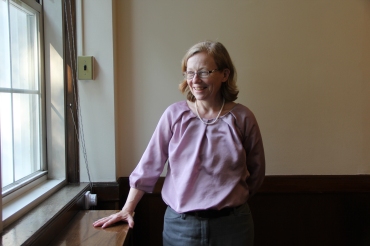
Maura mast will be spear heading the upcoming town hall meeting.
By Yasmin Merchant
Correction: An earlier version of this article included a misquote from Trevethik saying that student’s and faculty “can’t” comment at the town hall, when he intended to say they “can.”
“There will be a public comment section in which students and faculty CAN speak out on the importance of implementing the Just Employment Policy.”
In an effort to address the lack of transparency and connection between Fordham students and administration, the Fordham College Rose Hill Dean’s Council is hosting a Town Hall meeting with Dean of Fordham College at Rose Hill. Maura Mast. The Town Hall will give students and faculty the opportunity to voice their concerns and bring up issues directly to administration. It will take place on Dec. 1 at 5 p.m. in McGinley 235.
The Dean’s Council expects that several points will be brought up, including having tutoring centers in more advanced courses, core curriculum integration of Bronx history and diversity courses and improvements to registration, career services and academic advising. “However, ideally, this Town Hall Meeting is for the purpose of students to bring up new concerns and issues that haven’t already been addressed by the Rose Hill Dean’s Council,” said Garrison Groeschke, the chair of FCRH Dean’s Council.
Jesuit Just Employment was brought up as well. Earlier this year, some adjunct professors went on fast to bring attention to their poor working conditions. The adjunct professors are fighting for a higher wage, insurance and more job security. Anthropology professor Alan Trevithick reported that over 100 faculty spanning the sociology, anthropology, media and communications, foreign language, theology, history, law, American studies, philosophy, math and English Departments and Graduate School of Social Service have expressed interest in attending the Town Hall meeting. Just Employment is on the Dean’s Council agenda. “There will be a public comment section in which students and faculty can speak out on the importance of implementing the Just Employment Policy, (of the kind in place at Georgetown) at Fordham,” Trevithick said.
Due to the many bias incidents this semester, beginning with a racial slur written on a student’s door in Lalande, diversity will be discussed. Father Joseph M. McShane, S.J., President of the University, has sent the Fordham community a number of emails condemning this behavior. “Fordham…devotes significant time, effort and funds to education around these issues, and we are always looking for ways to improve our efforts and use our resources more effectively,” he said in his latest email. “We talk about ‘building’ a better campus community, but that is really the wrong metaphor: what we do is really gardening. We grow, we feed, we nurture. It is a slow and continuous process.”
Both students and faculty members have commented. Anne E. Fernald, professor of English and women’s studies and president of the Faculty Senate, said the Faculty Senate had “been deeply disturbed by the recent acts of racism and antisemitism as well as by the story these actions seem to tell about deeper problems in our community.” Six undergraduate students spoke at the Faculty Senate, identified through The Gender and Race Equity and Faculty Diversity and Retention Committee and ASILI. “They spoke of professors admitting a lack of interest in African-American history and culture in a class that aimed to instruct students on these very topics and of professors who lacked competence in responding to student’s racially insensitive comments.”
Some professors have admitted that they do not feel equipped to respond properly to these issues. At the October College Council Meeting Robert Grimes, dean of Fordham College at Lincoln Center said that “Many professors had voiced their concerns about being able to respond properly after Father McShanes’ email asking professors to discuss this in class … students have also noted that they felt that many professors were not responsive.”
This topic was also discussed during the Nov. 12 USG meeting. According to USG members, several faculty members have said they do not feel comfortable discussing racial incidents and they do not want to feel like they are trivializing it. The Faculty Senate has been discussing what can be done to rectify this. “The students encouraged faculty, who often appear to lack training in how to address or discuss racism in class to participate in training like that offered by the Undoing Racism Collective,” Fernald said. The goal of this Town Hall meeting, according to USG is to allow the Fordham community to come together and put initiatives like this in action.

Either I misspoke or it’s a typo, but that should be “can” not “can’t” as in “There will be a public comment section in which students and faculty CAN speak out on the importance of implementing the Just Employment Policy.”